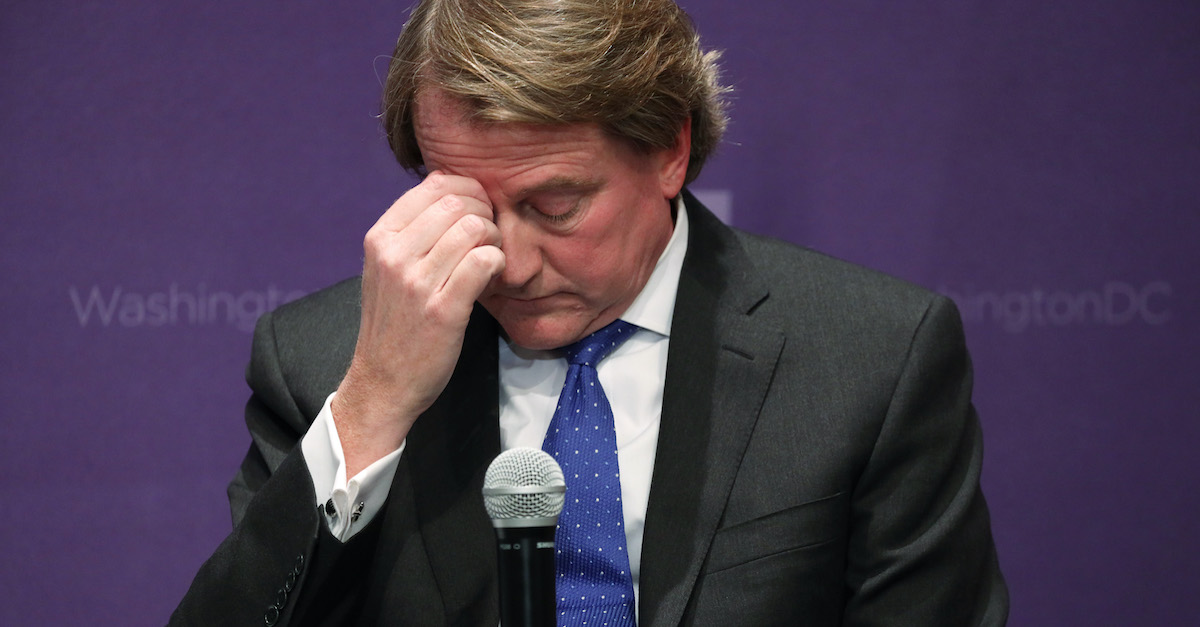
WASHINGTON, DC – DECEMBER 12: Former White House counsel Don McGahn during a discussion on “Constitutional Questions and Political Struggle: Congress’ Role in Oversight and National Security” December 12, 2019 at the NYU Global Academic Center in Washington, DC.
In a fit of pique over Special Counsel Robert Mueller’s Russia investigation, former President Donald Trump almost reached an “inflection point” and “point of no return” that would have set in motion a Richard Nixon-style “Saturday Night Massacre,” ex-White House Counsel Don McGahn recently told Congress behind closed doors.
The just-released transcript of McGahn’s closed door testimony before the House Judiciary Committee contains a series of new answers and elaborations on details that were publicized in the Mueller Report.
Releasing the June 4th transcript on Wednesday, Judiciary Chair Jerry Nadler (D-N.Y.) said: “Mr. McGahn provided the Committee with substantial new information—including firsthand accounts of President Trump’s increasingly out of control behavior, and insight into concerns that the former President’s conduct could expose both Trump and McGahn to criminal liability.”
“Mr. McGahn also confirmed that President Trump lied when he denied the accuracy of the Mueller report, and admitted that he was the source for a Washington Post report that confirmed Trump’s direction to McGahn to remove the Special Counsel,” Nadler wrote in a statement.
In the transcript, McGahn explains his reluctance to convey a message from Trump pressuring then-Deputy Attorney General Rod Rosenstein to not allow the special counsel to serve because of alleged conflicts—a request that McGahn considered an “inflection point.”
“‘Inflection point,’ with that I meant a point of no return,” McGahn testified. “If the Acting Attorney General received what he thought was a direction from the counsel to the President to remove a special counsel, he would either have to remove the special counsel or resign. We are still talking about the ‘Saturday Night Massacre’ decades and decades later.”
The Saturday Night Massacre was the name given to Nixon’s decision to fire the special prosecutor investigating Watergate. Nixon demanded that three of his top officials carry out his order. The first two top officials at the Justice Department refused and resigned, but the third-most senior official, then-solicitor general Robert Bork, complied and stayed.
McGahn quipped that he wanted his reputation to be “Judge Robert Bork” and not “Saturday Night Massacre Bork,” according to the transcript.
Spanning 241-pages, the colorful transcript records McGahn’s response to Trump’s insults and former National Security Adviser Michael Flynn’s assertions about his contacts with Russian diplomat Sergey Kislyak.
Asked by the House Judiciary Counsel’s Sarah Istel about Trump calling him a “lying bastard,” McGahn described the jibe as “disappointing.”
“Why?” Istel asked.
“Well, because it’s not true. And,” McGahn replied.
“Why isn’t it true?” the counsel prodded.
“Because I’m not a lying bastard,” McGahn clarified. Recall: Trump claimed during an interview with ABC’s George Stephanopoulos in 2019 that McGahn lied under oath when testifying that Trump suggested firing Mueller as special counsel. Why? Because, according to Trump, McGahn wanted to “make himself look like a good lawyer.”
Asked on June 4 whether former White House Chief of Staff Reince Priebus’s remarks that Trump asked McGahn to “do crazy shit” was a fair characterization, McGahn first responded that Trump would probably have found it unfair.
Prodded about his own opinion, McGahn said: “I think it’s fair.”
As for Flynn and Kislyak, McGahn did not appear impressed with the retired general’s claims that he had forgotten the details of his lengthy discussion with the Russian diplomat about sanctions. McGahn agreed he thought Flynn was lying.
“I don’t think he could have forgotten,” McGahn told the committee. “It just didn’t ring true.”
Flynn pleaded guilty to making false statements to the FBI about the Kislyak discussions in late 2017, well before being pardoned by Trump in the twilight of his presidency.
Read the transcript below:
(Photo by Alex Wong/Getty Images)